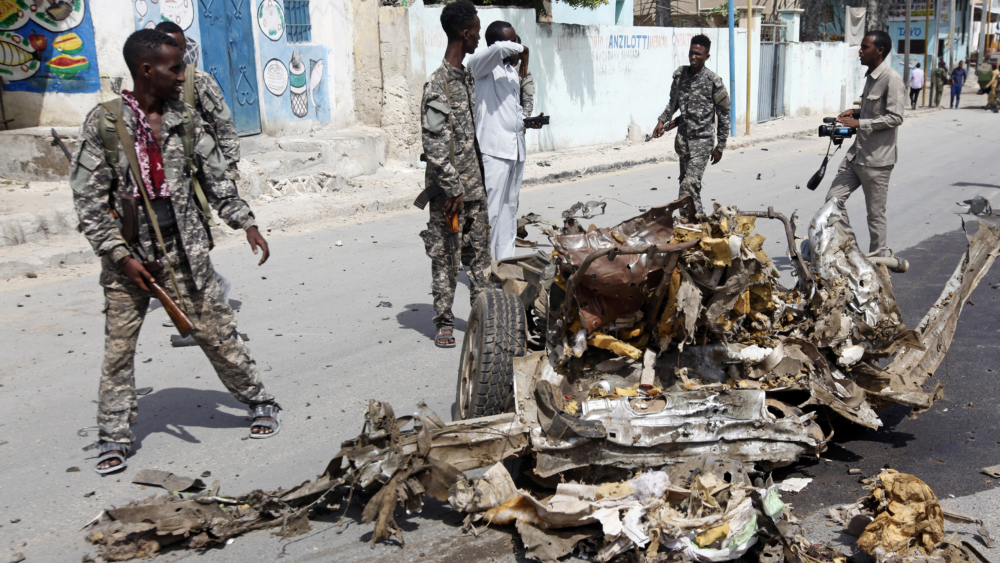Christian workers in Somalia worship in secret, fear al-Shabab
“It’s very dangerous for anyone to identify you as a Christian in this country.”
MOGADISHU, Somalia (RNS*): In a small single-room house in the Banaadir district of Somalia, dozens of Christians worship in secret out of fear of persecution in a country where no official churches exist.
They sing, dance and testify though not as exuberantly as in Christian services held in other African nations.
“We meet secretly in one of our houses and pray.”
“I thank you, Jesus, for giving me this opportunity to worship you,” said a man wearing a red cap as he stood among the other congregants. “Protect my family and all Christians around the world. We know and believe that, Jesus, you are the lion of Judah who can defeat our enemies.”
Another woman wearing a blue dress and holding her Bible prayed to herself. “I give thanks to Jesus Christ for saving me from attacks and not being hit in the explosions,” she said.
Hundreds of Christians in Somalia, typically foreigners from nearby countries who work across the East African nation, fear Muslim extremists: jihadists in al-Shabab (a group linked to al-Qaida), as well as rogue elements among their otherwise peaceful neighbours who would kill them if they knew they held Christian services.
Around 99.8 percent of Somalis are Muslim, according to the World Bank.
“We meet secretly in one of our houses and pray,” said Pastor John, who asked that his real name not be used out of fear for his security. “It’s always a normal service but there’s no shouting and singing loudly. The people around here are not friendly, especially when they discover you are a serious Christian.”
John, who is a Kenyan pastor and a building contractor, has been working in Mogadishu for the last five years. Among his congregants are a few Somali converts who also live in fear in their own country for choosing Christianity.
“It’s very dangerous for anyone to identify you as a Christian in this country. You will, in fact, be counting your days on Earth,” said John, adding that he stayed in the country to spread the gospel and earn a paycheck. “So we are always silent as long as we meet and share the word of God in private. But we have always trusted Jesus for protection, as the Bible says.”
In recent years, the situation for Christians in the Horn of Africa has worsened, as illustrated by killings shared on social media. In the region under the control of al-Shabab, the militants hunt for Christians.
The militant group holds to the strict Islamic doctrine of Wahhabism and promotes an extreme version of Sharia law. But local clan elders support them, acting as intelligence gatherers who report suspected non-Muslims.
Al-Shabab has also launched attacks on churches and schools in neighbouring Kenya, leaving hundreds of Christians dead. In October, two Christian schoolteachers were killed in an attack by suspected al-Shabab militants in northern Kenya near the Somali border.
“We will never allow any new church to be built in Somaliland.” – Minister for Religious Affairs
Kenyans still vividly remember the attack on Garissa University in April 2015, when al-Shabab fighters singled out and killed Christian students.
The U.S. State Department has labeled al-Shabab one of several “entities of particular concern,” based on a recommendation from the U.S. Commission on International Religious Freedom. That label is used for groups that commit “systematic, ongoing, egregious violations” of religious freedom, according to USCIRF.
Christians in Somalia have lamented their lack of freedom to worship. In August 2017, the only remaining Catholic church in Somalia was closed a few days after it opened temporarily. A public outcry resulted from the opening, with many calling for the church to be shuttered. Politicians listened.
“We have decided to respect the wishes of the people and their religious leaders and keep the church closed as it has been for the past 30 years,” Sheikh Khalil, the minister for religious affairs in Somaliland, an autonomous region in the country, told journalists at the time. “We will never allow any new church to be built in Somaliland.”
Catholic Bishop Giorgio Bertin, who oversees Djibouti and also acts as the Pope’s representative to Somalia, said it would be hard to open a church in the country.
“It’s very hard to operate a church in Somalia because of the risks Christians face there,” said Bertin, who noted at least 100 Catholics live in Somalia. “They are forced to pray and worship secretly because it’s risky being identified as a Christian in Somalia.”
John, the pastor, wondered why Muslims often were allowed to worship freely in foreign countries but their leaders often barred or stood by as others barred foreigners from worshipping in their countries.
“That’s very bad and they should think about it,” he said.
* Religious New Service – used with permission

